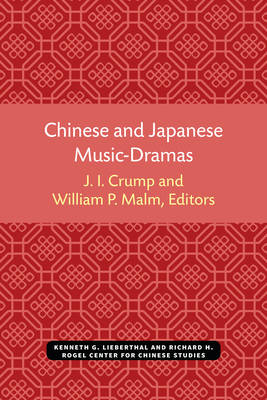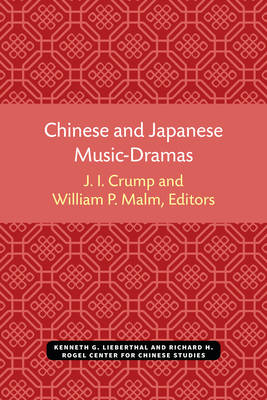
- Retrait gratuit dans votre magasin Club
- 7.000.000 titres dans notre catalogue
- Payer en toute sécurité
- Toujours un magasin près de chez vous
- Retrait gratuit dans votre magasin Club
- 7.000.0000 titres dans notre catalogue
- Payer en toute sécurité
- Toujours un magasin près de chez vous
Chinese and Japanese Music-Dramas
25,45 €
+ 50 points
Description
Chinese and Japanese Music-Dramas is the result of a conference on the relations between Chinese and Japanese music-drama held at the University of Michigan, Ann Arbor, on October 1-4, 1971. In addition to the Association for Asian Studies, four U-M departments participated in the conference: the Center for Japanese Studies, the Center for Chinese Studies, the School of Music, and the Speech Department. One important inspiration for the creation of such an interdisciplinary conference was the fact that each participant had found, after years of individual research on music-drama in East Asia, consistent frustration caused by attempts to deal on their own with multiple cultural and technical problems. Another motivating force was an awareness among many members of the four disciplines involved that the topic is in fact one of the largest untouched fields of scholarly endeavor in both Asian and theatrical studies. The collection opens with J. I. Crump's exploration of the Ming commentators who began to subject Yüan musical drama to the same critiques as other literature from the past. In the second chapter, Rulan Chao Pian looks to the structure of arias in Peking Opera for clues about what distinguishes this art form. William P. Malm turns to three key sources for the performance conventions of Japanese Noh drama to glean any Sino-Japanese music relationships that exist in technical terms and practices. In the fourth essay, Carl Sesar analyzes a Noh play that stages the tension between Chinese influence and Japanese originality. Roy E Teele concludes the volume with a formal study of Noh play structure to assess lineages of influence from Chinese dramatic forms. After each contribution, the editors print a transcript of the conference participants' discussion of that paper, providing the reader with a detailed and nuanced view of how the contributors understood and responded to each other's work.
Spécifications
Parties prenantes
- Editeur:
Contenu
- Nombre de pages :
- 255
- Langue:
- Anglais
- Collection :
Caractéristiques
- EAN:
- 9780472038022
- Date de parution :
- 01-02-21
- Format:
- Livre broché
- Format numérique:
- Trade paperback (VS)
- Dimensions :
- 152 mm x 229 mm
- Poids :
- 394 g

Les avis
Nous publions uniquement les avis qui respectent les conditions requises. Consultez nos conditions pour les avis.





